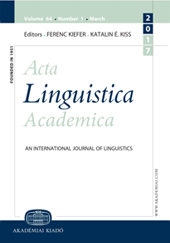Emergent Phonological Constraints - The acquisition of *COMPLEX in English
Emergent Phonological Constraints - The acquisition of *COMPLEX in English
Author(s): Jeroen van de WeijerSubject(s): Language studies, Theoretical Linguistics, Phonetics / Phonology, Philology
Published by: Akadémiai Kiadó
Keywords: Emergent Phonology; acquisition; English; consonant clusters; Optimality Theory; innateness; constraints; Universal Grammar;
Summary/Abstract: Emergent Phonology seeks to minimize the role of Universal Grammar in linguistics by investigating how units such as distinctive features, segments, words, morphemes, and syllables, and other aspects of grammar, such as phonological, morphological or syntactic rules and conditions, emerge in the course of acquisition and language use, rather than as part of an innate language capacity. An obvious candidate for being acquired rather than being innate are the phonological constraints that take a central place in Optimality Theory. In this paper I discuss whether, and if so how, a constraint like *COMPLEX ‘No complex onsets’, which is assumed to be active in the acquisition of English and many other languages, could be acquired on the basis of the data to which the English language-learning child is exposed. If this constraint is acquired, it lessens the burden on any innate capacity, which is hypothesized to contain more general, cognitive strategies–perhaps not exclusive to linguistics.
- Issue Year: 64/2017
- Issue No: 1
- Page Range: 153-165
- Page Count: 13
- Language: English

